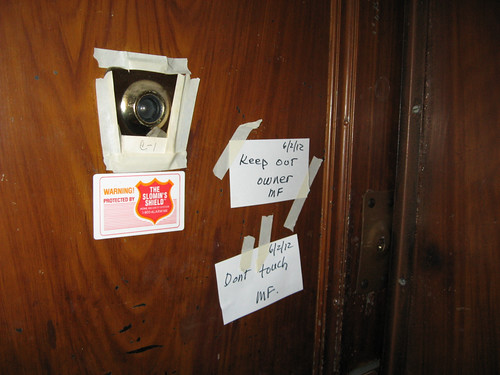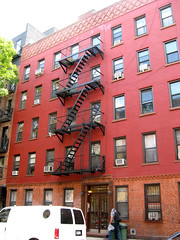 Melvin Felix The Mosaic Man’s cane and service
Melvin Felix The Mosaic Man’s cane and service
dog, in court today.After being thrown out of his studio in the basement of Barbiere, Jim Power avoided eviction from his apartment at The Lee today. Mr. Power, known for creating the neighborhood’s mosaic trail and outfitting local businesses like Porchetta and The Bean, agreed to pay $547.29 in outstanding rent by the end of September, staving off a return to homelessness.
In July, the low-income residence brought a lawsuit demanding $806.66 in back rent and requesting a final judgment of eviction. The Mosaic Man said he had stopped paying the monthly dues for his rent-stabilized apartment in order to protest a slew of problems at 133 Pitt Street. This week, he told The Local, he found a pool of blood in a building elevator.
“It’s shocking,” Mr. Power said. “They need to put a security guard in there with a gun.” (The Local has left a message with a spokesperson for Common Ground requesting comment.) Read more…
 Stephen Rex Brown The door to Martha Fedorko’s apartment.
Stephen Rex Brown The door to Martha Fedorko’s apartment.East Village landlords often make for easy villains. Just ask State Senator Thomas Duane about Benjamin Shaoul, the Shalom family, and Alistair Economakis. But the residents of 510 East Sixth Street face a particularly vexing situation.
 Stephen Rex Brown 510 East Sixth Street.
Stephen Rex Brown 510 East Sixth Street.By most accounts their landlord, Martha Fedorko, was once a generous owner and accomplished doctor who helped out tenants when she could. Luc Sante wrote all of “Low Life: Lures and Snares of Old New York,” in the building, and thanks her in the acknowledgements of the book published in 1992. “She was absolutely the best landlord I ever had,” said Mr. Sante, who now lives in Kingston, N.Y.
But residents say that as she has grown old, Ms. Fedorko has started cutting their electricity for no reason, telling them to vacate their apartments at random times, menaced one of them with her cane, and left inscrutable letters in the hallway. Read more…
 Shira Levine
Shira LevineFor every East Village business that’s opening or closing, dozens are quietly making it. Here are two of them: Village Kids and Foot Gear Plus.
While in high school, Tony Scifo worked part-time for a shoe guy. In 1980, at the tender age of 19, he bought Foot Gear, the shoe shop across the street at 131 First Avenue. Two and a half years ago, he and his big sister Linda Scifo-Young opened Village Kids, selling children’s kicks just a block away at 117 First Avenue. Ms. Scifo-Young used to work in corporate real estate, so she wasn’t scared of going into business during a financial crisis. “As a real estate broker, I knew that the only time I could get a decent lease for the second store was when the market was bad,” she said. The Local spoke to her at Village Kids about whether her gamble paid off.
Q.
What influences your business the most?
A.
The funny thing is that in actuality we’re in the weather business. If the weather cooperates, we’re good. If it’s cold when it’s supposed to be cold, then we have a good season. If it’s hot when it’s supposed to be hot, then we have a good season. If any of those things don’t work, you have no season. This year was hard with how the weather cooperated. Read more…
 Suzanne Rozdeba Joe Barbosa had been selling records outside of the store.
Suzanne Rozdeba Joe Barbosa had been selling records outside of the store.Earlier today, John Kioussis hauled a turntable and a few remaining crates of records out of an empty, darkened storefront at 33 St. Marks Place. Before locking up the narrow nook that has housed Rockit Scientist Records since 2003, he said he had closed in part because of squabbles with one of his landlords.
Mr. Kioussis let forth a litany of complaints about Amnon Kehati, a co-owner of the building (which is for sale) and of Mark Burger next-door: he had set up tables in front of his store without asking, made unreasonable complaints about garbage bags being left out, and accused the record store of attracting rats.
“The reason we have rats in the building, according to the landlord, is because I have records downstairs and rats are attracted to records,” Mr. Kioussis said as he cleared out his shop. “I wonder what scientist would tell you that Bob Dylan and Sex Pistols records attract rats as opposed to bags of tomatoes and onions all over the floor.” Read more…
 Shira Levine From left, Jason Brickman, his father, Paul Brickman, and in the backgroudn the store manager, Ruben.
Shira Levine From left, Jason Brickman, his father, Paul Brickman, and in the backgroudn the store manager, Ruben.For every East Village business that’s opening or closing, dozens are quietly making it. Here’s one of them: H. Brickman & Sons.
Want to stay in business for seventy-nine years in the East Village? H. Brickman & Sons at 55 First Avenue owe their success to two valuable business decisions that Great Grandpa Hyman Brickman made in 1933 when he opened the first location of the hardware store. First, be your own landlord. Second, keep it in the family. Now, the store has employed four generations of Brickmans, and has two other locations at 125 West Third Street and 312 First Avenue near 18th Street. Making It spoke to Brickman’s third generation owner, Paul, about keeping things familial and when it’s time to pass the torch.
Q.
How was it decided that this would be a family business?
A.
My grandfather ran it for three decades and then he had my father take it over in the 1960s. Business was too good to let it go. When my father retired about 17 years ago it was my turn. My cousin’s husband and I took it over. Now I’m grooming my son and my cousin’s son who will be the fourth generation to take over. Read more…
 Michelle Rick
Michelle RickCommunity Board 3 continues to debate whether it should soften its hardline stance against new beer-and-wine licenses in nightlife-saturated areas. Last night, a task-force meeting pitted residents who don’t want to see C.B. 3 bow to late-night noisemakers against a landlord who said he has been financially stymied by the board’s current policy.
In response to evidence that the State Liquor Authority routinely approves beer-and-wine applications even when C.B. 3 recommends disapproval, the board may start supporting the soft stuff in resolution areas that are currently verboten, so long as the applicant agrees to operate primarily in the daytime and close at midnight or earlier. The new stipulations, the board hopes, will both curtail noise and attract more diverse – and especially daytime – businesses.
Residents who live on streets like St. Marks Place and the avenues of Alphabet City, which devolve into something resembling a carnival on weekend nights, showed up at C.B. 3’s offices on East Fourth Street to voice their concerns about the potential policy shift. Read more…
The housing advocates at Good Old Lower East Side will host a workshop next Wednesday on how to use the state Department of Housing and Community Renewal to one’s advantage in the fight against neglectful landlords. The talk will cover how to best to combat “harassment, rent overcharges, reduction of services” and other common tenant woes. A lawyer will be on hand to answer questions beginning at 7 p.m. at the Perseverance House at 535 East Fifth Street.
In 11 days, changes in the laws that regulate how much your landlord can charge in rent per month will begin to take effect.
However, the changes are not exactly what local tenant advocacy groups wanted. Many groups, including the Cooper Square Committee, Real Rent Reform, Tenants and Neighbors and the Good Old Lower East Side were hoping state legislators would eliminate the rent laws’ vacancy decontrol, which allows a landlord who renovates a unit to charge more in rent per month to a new tenant after the previous vacates the unit. Instead, vacancy decontrol remains in the law.
The renewed laws, which were passed in conjunction with but overshadowed by the passage of same-sex marriage in New York, affect the residents of 1 million rent-regulated apartments across the state. It also affects the landlords of those buildings.
In the video above, The Local’s Khristopher J. Brooks offers a breakdown of some of the most significant changes.










